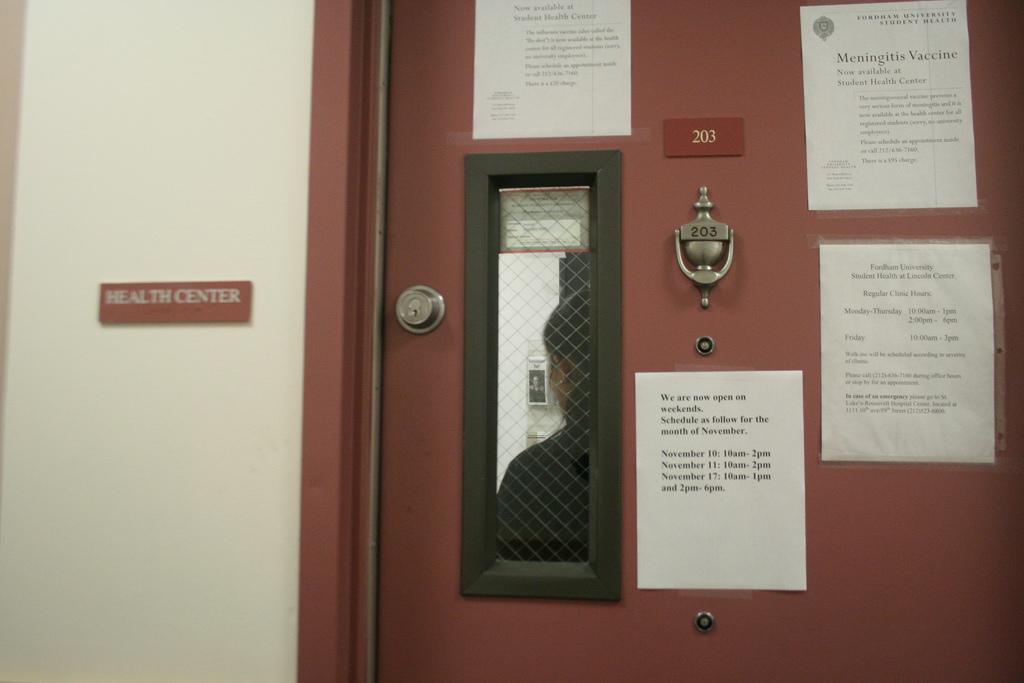Getting to Know Fordham’s Health Professionals
On Their Paths to Fordham, Student Health Concerns and Why We Don’t Need Q-tips
June 3, 2011

Published: April 3, 2008
While the Fordham College at Lincoln Center (FCLC) Health Center may be full of germs and illnesses, there wouldn’t be treatment and prevention without our standout Health Center staff.
Jennifer Mulvey,
FCLC Student Health Center Coordinator
The Observer: Where are you originally from?
Jennifer Mulvey: Westchester.
The Observer: Where did you go to college?
JM: I went to Manhattan College right here in the Bronx [and earned] a Biology degree. Then I worked in the business world for a year in marketing. I went back to school to be a nurse practitioner, and I have a bachelors and masters in nursing from Pace University in Pleasantville.
The Observer: Did you originally want to go into business?
JM: No, it was kind of just a temp position that I had to try and just work for a little bit to figure out what direction I would take with future schooling.
The Observer: What made you go back to school and get your bachelors and masters in nursing?
JM: I always knew I wanted to do something in health care, but I wasn’t sure exactly what. My mom’s a nurse, so I’m sort of partial to nursing. And I liked the idea of an advanced practice nurse where I could have more autonomy and independence with an advanced degree.
The Observer: What exactly is a nurse practitioner?
JM: We practice alongside physicians. We can diagnose and treat. We have prescription privileges and work collaboratively with physicians. So, we can do about 80 percent of what a physician can do.
The Observer: What made you come to a university health center rather than anywhere else in the medical field?
JM: Having worked in a hospital for a number of years, it’s very difficult to do any sort of teaching, education, disease prevention, because everyone’s already so sick. So, this is a great setting with healthy young adults where you can do a lot of disease prevention and health education, which is a main focus that nurse practitioners have that sets them apart from other health care providers.
The Observer: What would you say is a primary health concern for college students that they might not typically think about?
JM: One thing would be sleep. Sleep is very important, and I don’t think a lot of college kids get a lot of sleep, which could lead to other issues down the road. So, sleep. Get enough sleep, around eight hours.
The Observer: What’s one random fact about yourself?
JM: I like to travel, which I haven’t done in the past couple years. But in the past, I’ve spent a week and a half in Russia, and I drove from Germany to a little island off the coast of Croatia. We drove through the Swiss Alps and the climate changed. It was neat.
Kathleen Malara,
Director of Student Health Services
The Observer: Where are you originally from?
Kathleen Malara: I grew up in Hawthorne and now live in Peekskill.
The Observer: Where did you work before Fordham?
KM: Before I came to work at Fordham, I worked for many years in Emergency Departments in Manhattan and Westchester County. My last job before Fordham was at Sound Shore Medical Center (SSMC) in New Rochelle. I worked for SSMC for nine years, and during that time I was the Coordinator of the Emergency Department for five years. Then I worked in home care as an RN. After I became a Nurse Practitioner, I worked in employee health and at an outreach clinic that SSMC owned in the South Bronx.
The Observer: Why did you choose to work at a university health center over another place in the medical field?
KM: When I decided to accept the position as director for Fordham’s Student Health Services, I had never even thought of college health care. I had a strong clinical background [but] I wasn’t sure if I would like it. My colleagues thought I was crazy and would be bored. Well, that never happened; it’s been a rich, rewarding, challenging milieu to practice in and has never been boring!
The Observer: What would you say is a primary health concern for students that they might not typically think about?
KM: The primary health concern for students is stress and the effects it has on their overall mental and physical health.
The Observer: What is something that only you know working in the medical field that people may be surprised to hear?
KM: That Johnson and Johnson decided we did not need earwax. Q-tips are just an invention. God gave us earwax. J&J decided we didn’t need it and make a lot of money selling their product. Actually, you should not put anything smaller than your elbow in your ear!
The Observer: What’s a random fact about yourself?
KM: I am an avid golfer, I knit like crazy, and I love to work on refinishing my 110 year old home.











